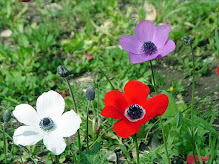If pain for peace prepares
Lo, what "Augustan" years
Our feet await!
If springs from winter rise,
Can the Anemones
Be reckoned up?
If night stands first—then noon
To gird us for the sun,
What gaze!
When from a thousand skies
On our developed eyes
Noons blaze!
- Fr 155 (1860) J150
There is one underlying idea here: that the difficult prepares us, or at least precedes, the good. Pain, for example, prepares for the peace of “Augustan” years – that is, years of quiet reflection. Cold winter prepares the anemone bulbs to raise their lovely flowers in presage of spring. Long, dark nights bring such longing for sun, developing our eyes, that “Noons blaze” in glory.
 |
| Anemones https://commons. wikimedia.org/wiki/File: Anemones5.jpg |
There is a mathematical element here as the amount of difficulty is related to the amount of resultant good. With all the pain we suffer in life, there must be many peaceful years ahead. Winters (at least New England winters) can be so harsh that the anemones are uncountable in their spring profusion.
The poem builds climactically to the dramatic “Noons blaze!” The first two lines of each stanza are in stately iambic trimeter, setting a solemn tone. The last line of the first two stanzas are are dimeter iambs, rounding off the question with an image: the struggling person with tired feet; the counting of the anemones.
But then the last two stanzas end with rhyming spondees: “What gaze!” and “Noons blaze!” The excitement, I think is to let us know that the poet has something else in mind than a bright noon after a dark night. How brilliant heaven will seem, lit by “a thousand skies”, when we leave the darkness and toil of earth
The poem builds climactically to the dramatic “Noons blaze!” The first two lines of each stanza are in stately iambic trimeter, setting a solemn tone. The last line of the first two stanzas are are dimeter iambs, rounding off the question with an image: the struggling person with tired feet; the counting of the anemones.













